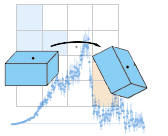
| HOME | PEOPLE | RESEARCH | ACADEMICS | TRAVEL/VISITORS | LINKS | CONTACT |

|
Web Mail
Mailing Lists
Computing Resources
Site Map
Robust and optimal control of complex interconnected systems
Raffaello D'Andrea, Cornell University, Assistant Professor, Mechanical and Aerospace Engineering
Monday, November 8, 199911:00 AM to 12:00 PM
Steele 102
Many systems consist of similar units which directly interact with their nearest neighbors. Even when these units have tractable models and interact with their neighbors in a simple and predictable fashion, when viewed as a whole the resulting system often displays rich and complex behavior. Examples include vehicle platoons, vehicles flying in formation, and in the limit as the size of the subsystems approach zero, many systems governed by partial differential equations.
An important aspect of many of these systems is that sensing and actuation capabilities exist at every unit. In the examples above, this is clearly the case for vehicle platoons and aerial vehicle systems; with the rapid advances in microelectro-mechanical actuators and sensors, one may control systems governed by partial differential equations with a large number of distributed actuators and sensors as well. If one attempts to control these systems using standard control design techniques, severe limitations will be quickly encountered as most optimal control techniques cannot handle systems of high dimension and with a large number of inputs and outputs. In addition, it is typically not feasible to control these systems with centralized schemes, as these require high levels of connectivity, impose a substantial computational burden, and are typically more sensitive to failures and modeling errors than decentralized schemes.
In this talk we discuss new techniques for synthesizing control systems for spatially distributed and interconnected systems. From the point of implementation, the resulting control strategies inherit the same structure as the plant; in particular, the controllers are distributed, with communication allowed between neighboring controllers. The advantages of decentralized computation are thus obtained, without sacrificing global performance objectives. The talk includes several in-depth simulation/animation examples and a discussion of several experimental test-beds being used to motivate the tools being developed.
|
©2003-2011 California Institute of Technology. All Rights Reserved webmaster |
|